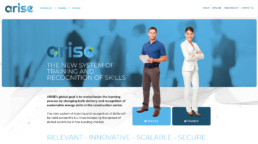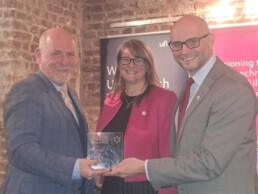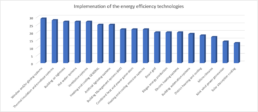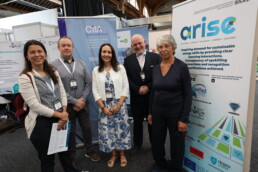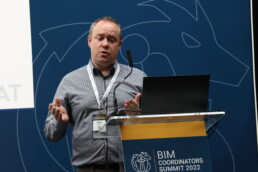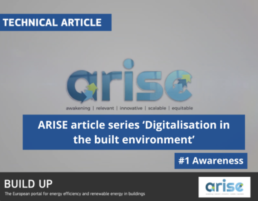Women in construction: gender stereotypes and education initiatives
The construction industry is historically a predominantly male sector and it still is today, despite the evolution of techniques, and the progress in innovation and safety. Although there is a slight trend of more women getting involved, there are still very few of them who choose this field worldwide. The same we can argue about younger tech savvy generations. Yet, this sector offers a great variety of careers and great opportunities for everyone.
Thanks to the development of ever-new technologies and an increase of digitalisation as well as an inclination towards more environmentally sustainable practices, the construction industry today offers a variety of positions perfectly within the reach of men and women equally.
There is the need to break stereotypes that still persist today and demotivate younger people and women from taking an interest in careers in this sector. A part of the solution could involve implementing education practices that would be informative and stimulating to a younger audience, including women and men equally.

Where do stereotypes come from?
According to a series of surveys conducted in the Southern part of Italy in 2024, in this region stereotypes around the construction sector often concern exploitation and safety, bad hygiene and practical disorganisation of construction sites.
Among other popular concerns, there is the existence of many micro family construction businesses that offer little flexibility to workers. Other doubts concern career possibilities, given that this sector is still seen today as a 'makeshift' choice of profession compared to other ‘more stable’ ones, and with less possibility of future career shifts and fewer contractual protections.
Predominantly female preoccupations involve the fear of absence of contractual concessions, for instance, in case of maternity leaves, and the incompatibility with a family life schedule.
Another stereotype, is about the idea that work in the sector is only physical and therefore tiring and only suitable for men. The sector offers a wide range of physical
and non-physical occupations, within everyone's reach.
Finally, important concerns are linked to poor remuneration and an unstable economic future.
The existence of preconceptions are above all attributable to the lack of adequate and sufficient guidance in schools and advice for young graduates.
Even if the surveys concerned Italy, many of them could be translated in other regions, and are worth serious consideration all over Europe.
Some of these reported issues await serious interventions from businesses and the establishment of better local policies. In certain instances, we could easily arrive at solutions that would result in more interest from women but also from younger people, who are very sensitive to the problems of risk, lack of opportunities and low pay.
Orientation programs and initiatives in the education system
With the hope that construction site work will soon become more accessible to everyone, it is important to dissipate false believes, starting from childhood. In fact, we could try to reduce the differentiation between "male" or "female" toys and games and in general present the variety of possible future professions in a more neutral and objective way, considering technological and social innovations.
The bodies that deal with training (schools, training centers and specialized companies) should first of all strengthen relationships with companies in the sector that place employee training and innovation in the construction professions first.
A clear presentation of the variety of different opportunities regarding construction careers is necessary, even directly by young people and women already working in the field, to dispel the false belief of a "hard and dirty" profession.
It is important to give visibility to the concept that construction is not limited to manual work but it also offers a large scale of intellectual and creative activities. This is also thanks to the development of ever new technologies, which with the contribution of new professionals will continue to develop exponentially in every branch of the field.
We should promote and encourage the use, right from school, of software and programs dedicated to new professions. Today it is possible to download free software that allow, for example, to easily reproduce an apartment digitally and which is already within everyone's reach, including boys and girls in their first educational cycle.

By taking advantage of what digital technology already offers today, stimulating school initiatives could be promoted such as training workshops that invite sharing and group planning, to promote the development of new ideas in collaboration with one's classmates.
An example of digital application to the construction industry is BIM, a system based on sharing and co-design that the current system of education would not put among its primary objectives. Most educational processes nowadays are in fact designed to be carried out "autonomously", while in the construction world everything is interconnected. The architectural project cannot, in fact, ignore the structural or plant requirements, nor the impact that each of these choices has on the environment directly or indirectly, or the needs of the end users.
Professional training should include internships with professional studios and/or construction companies that already exploit digital technologies and therefore with direct experience in the field.
It is also essential to clearly present the general development of skills offered by jobs in construction through a presentation at 360° of the sector.
New uses of technologies and schools initiatives
Health and safety at work should represent a pre-requisite to any other training course and the use of artificial intelligence for safety on construction sites should also become a learning requirement. AI is, for example, capable to detect anomalies in daily activities on the construction sites and therefore avoid unnecessary risks. Through constant monitoring via cameras and sensors, AI is able to identify unusual or non-compliant behavior with safety procedures and to recognize potentially dangerous situations, such as, for instance, the presence of risky substances not managed correctly.
Another example of an innovative use of digitalisation is that of the use of "smart glasses", devices which, once installed on the helmet connected to specific software, allow you to compile check lists through voice commands, but also take photos and record automatically. Elements which therefore make the inspection of the construction site more precise. Furthermore, the collaborative platform can put workers in communication with the office, to remotely obtain information on how to proceed or even the documentation to allow implementation in compliance with the project.
Knowledge of these cutting-edge technologies could also be acquired by inviting young people to participate to "building fairs" and to experience them directly in workplaces and ongoing and completed construction sites. This would allow being able to listen to the direct testimonies of designers and builders.

In the image above, a company specializing in acrobatic restoration gave the opportunity to boys and girls to experience the feeling, thanks to augmented reality glasses, of being harnessed at an altitude.
In the images below, the Formedil school of Udine brought the students of the school to the restoration fair in Ferrara, demonstrating the creation of artistic work, certainly suitable for both genres.



Another suggestion is to organise more public events such as, for example, the "career days" at high schools and universities.
It is essential to also socially and intellectually valorise the more artisanal professions, breaking the stigma of not sophisticated and poorly paid jobs. These professions can, on the contrary, offer interesting opportunities and particularly creative and original activities.
Towards a younger and more inclusive construction industry
In conclusion, to promote more participation of women and young people in the work in the construction industry, it is necessary to address some problems still present today, such as stereotypes linked to the industry, safety, poor working conditions and the possibility of successful careers. It is also fundamental to facilitate the possibility for women and young people to learn about all professional paths and possibilities present within the construction industry. These professional choices can in fact prove very satisfying for them and beneficial for the industry. This campaign should also be realised through school initiatives and the organisation of events and fairs that promote careers in the supply chain. Finally, it is essential to support and motivate women during their career path, so that they become examples and inspirations for the next generations.

ARISE e-learning platform on BIM and applied energy efficiency tools. ARISE webinars for Trainees (17 th January 2024) and Trainers (21 st February 2024), Webinar recordings.
ACE has organised two successful webinars with the collaboration with BUILDUP Team in January and February 2024 on the topic of “ARISE e-learning platform on BIM and applied energy efficiency tools” addressed to Trainees and Trainers.
The EU funded project ARISE has launched the e-learning platform on BIM and energy efficiency in buildings for the design and construction sector. This e-learning platform provides micro-learning units available anywhere, anytime. The platform covers an introduction to BIM terms and definitions, BIM benefits, and BIM tools for energy. The short duration learning modules offer clear and straightforward content adapted to the busy life of professionals and workers. The learning pathway can be personalised to match the skill gap of each learner. In less than an hour of study, the learning units provide clear, straightforward content relevant to the working lives of professionals. The e-learning platform is a powerful tool for improving the skills of teams based in different locations. The e-learning platform is very crucial for the professional and workers upskilling and re-skilling is the cornerstone of the implementation of the digital transformation in the design and construction industry. Innovative learning methodologies, materials and tools are the foundation to reduce the labour shortage and increase the offer of digital skilled professionals.
First Webinar for Trainees: The first webinar provided information by ARISE Partner and Curriculum Area Manager Construction & The Built Environment Belfast Metropolitan College, Andrew Hamilton, on the topic of "Digitalization to the Built Environment: ARISE Approach." The presentation on the digital transformation of the design and construction sector addresses the labour shortages, the new interface of upskilling training, and the benefits driven by the digitalization of the sector. Among other topics, Andrew Hamilton outlined how the ARISE training methodology is flexible allowing people to step on or step off, recognising the various points of their career and educational experience to date. And also, for those with no educational experience, to bring them on board and align them to gain the skills they need to have jobs and roles across the various sectors. Besides, ARISE partner and Researcher at TUDublin Ryan Dempsey discussed on the topic of "ARISE e-learning platform and the microlearning contents" which are already available on the ARISE Platform website. He presented what will be offered to the user, such as the deployment of different tools and teaching methods to cater for different learning styles. The last part of the webinar provided information about the ARISE offers presented by ARISE partner and Responsible for the international affairs BuildingSmart Italy - IBIMI Anna Moreno. At the end of the session, most of the Trainees were interested in the ARISE e-learning platform and the contents of the platform that ARISE offers. The majority were also interested in learning about ARISE platform developers and content creators, modules, module contents, badges, and certification. If you miss the first webinar, catch up with the video recording here.
Second Webinar for Trainers: The second webinar started with a session about ‘Digitalisation to the Built Environment – ARISE approach’, which delved into the improvement digitalisation can bring to the building sector. Paul McCormack from the Belfast Metropolitan College. Then, Ryan Dempsey from TUDublin gave an overview of the ARISE platform and how trainers can use it as an e-learning tool and highlighted that trainers could use the ARISE platform as a learning materials database to tailor the courses for specific users’ classes. The final part of the webinar focused on ARISE framework by Jaap Kolk from Building Changes focusing on the ARISE framework structure, which comprehends BIM application, utilisation, support, and basics. He highlighted that the ARISE learning framework also helps within projects, by linking the skills needed to the people providing them. The webinar ended with an interactive podium discussion, facilitating an exchange of questions between the speakers and the audience. If you miss the second webinar, catch up with the video recording here.
Create your account and sign up for free at ARISE e-learning platform modules here.
ARISE e-learning platform on BIM and applied energy efficiency tools - ARISE webinar for trainers - 21st February 2024
Date: 21st February 2024
Time: 11.00 - 12.00 (CET)
Link: coming soon
The professional and workers upskilling and re-skilling is the cornerstone of the implementation of the digital transformation in the design and construction industry. Innovative learning methodologies, materials and tools are the foundation to reduce the laubour shortage and increase the offer of digital skilled professionals.
The EU funded project ARISE has recently launched the e-learning platform on BIM and energy efficiency. The platform provides gamified micro-learning modules available anytime and anywhere. The short duration learning modules offer clear and straightforward content adapted to the busy life of professional and workers. The learning pathway can be personalised to match the skill gap of each learner.
his webinar is design for trainers in search for innovative e-learning platform, methodologies and tools. ARISE project partners will present the series of six articles on the digital transformation of the design and construction sector addressing the task-based framework, the gamification and the micro learning content developed by ARISE. Trainers will be guided through ARISE e-learning platform tools and content available. The trainers will be able to ask questions to the platform developers and content creators.
ARISE wins the Ufi VocTech Trust VocTech Future of Skills Award 2023!
ARISE wins the Ufi VocTech Trust VocTech Future of Skills Award 2023! ![]()
The VocTech Future of Skills Award is a new competition to share and celebrate big, tech-enabled ideas of how changes to the UK skills system could transform the way adults get the skills they need for work.
Award entrants were asked to answer a single question:
"If you could make one change to the skills system to get more adults learning, what would it be?"
The judge considered that BelfastMET entry "the central idea underlining this entry is that all learning 'transactions' have a value associated. As new skills are developed, they can be 'cashed in' for accreditation. A universal value of micro-credentials helps learners, employers and training providers have a shared 'currency' to represent equivalence. The technology proposed is blockchain - which is mainstream, but appropriate.
The judges felt this was a provocative and bold vision for an innovative system that seeks to give greater learner agency, advance micro-credentialing and other flexible and modular forms of learning, and change the debate about the value of skills. They felt that it challenged thinking about the way skills are valued and the motivation and incentive for adults to learn. They believed it would provoke debate, elicit strong responses, and stimulate extensive engagement."
Reaching a Sustainable Built Environment: Our Analysis
We just published the Report: “European roadmap: BIM applied to energy performance”.
The report provides inputs to develop a roadmap to achieve the correct development of a workforce ready to face the challenges of climate changes. The report starts recalling the requirements already defined in the European directives dealing with energy performance, the use of renewable energy sources, and digitalisation. Then, starting from the outputs of the previous deliverables, the roadmap summarises the knowledge, the skills and the competences needed both on the demand side and the offer side to obtain more resilient buildings to climate change with a decreased use of natural resources.
The roadmaps intend to ensure that current and future stakeholders interested in increasing the competences in the energy and digital domains, guarantee that existing and future training materials are adequate and continuously adapt to change. The roadmaps start from an in-depth analysis of the status quo in the participating countries.
The roadmaps should allow any company, public administration, and individual to fill the gap of competences and take advantages of all innovative energy and digital technologies.
In all the partner countries there is legislation supporting both the use of renewable energy sources and the improvement of the energy performance. Digitalisation is not always compulsory, but there are many initiatives to increase the competences in this domain starting from the public tenders where the use of BIM is becoming required in many countries. Consequently, we expect a huge future increase in the demand of digital competences needed in all the supply chain.
To provide the basis for the development of national roadmaps we considered a matrix where we suggest the level of knowledge/competence of the different targets for each technology. Digitalisation should be considered an instrument and not a final goal and should be applied by any blue and white collar of the building supply chain during its whole life cycle.
The goals of the directive are the same in every country. However, some countries are a few steps ahead in its implementation. To ensure the achievement of the same level by all, it is essential to promote the implementation of new technologies on both the demand and the offer side.
Based on a survey circulated among the project partners, we can make some interesting assumptions.
There is a strong correlation between the quality of the national VET (Vocational, Educational and Training) and LLL (Life-Long-Learning) systems and the use of technologies related to energy performance in buildings. North European countries developed more reliable training systems, and as a consequence they also make a better use of RES and technologies for energy efficiency. There is a persistent need, in all countries, to facilitate the use of more innovative technologies, which are still rarely taught in formal training.
In the following two diagrams we can observe the level of implementation of the different technologies considering the average of the different countries.
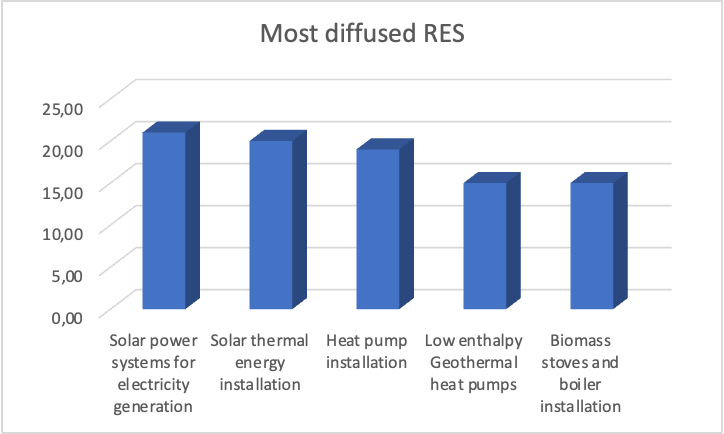

The ARISE platform can provide the support needed to achieve a higher maturity level in any sector and for any target as it is based on micro-competences. Thanks to the platform, the new technologies can be introduced directly by their producers. They can use it as a mean to provide training materials to be able to design, install and maintain new equipment and/or materials that can improve the energy performance of buildings.
The implementation of digitalisation shows that the problem is more related to the lack of a full maturity on the demand side. Designers are usually ready to implement digitalisation as it facilitates their work, but if the demand of public administration and both public and private owners does not increase, it cannot be fully implemented in the supply chain. The consequence is that the owners cannot profit from the benefit of managing all the information linked to their assets in order to decrease the cost of management and maintenance.
In the following diagram we can observe the different levels of maturity as average of the situation in each of the partners’ countries.

If the constructors do not implement the model received by the designers with the information of the products and equipment used and installed, the owner gets only marginal benefit from the BIM model produced by the designer. Therefore, there is a strong need to increase the comprehension of the benefits introduced by the full implementation of BIM in the supply chain. This analysis is also useful for training program developers and providers, providing them with directions on how to profile their programs.
In this case too, the ARISE platform can be beneficial as the European chapters of buildingSMART international are working for an agreement aimed at increasing awareness of the benefits of BIM along all the supply chain using the training materials developed for the individual qualifications available for free to everyone.
For more information, download the Report here.
ARISE Survey on the support of the digitalisation of the built environment, public procurement and SMEs in construction
The aim of this survey is to collect, analyse and summarize information about national legal and regulatory frameworks for sustainable energy skills demand in procurement procedures for building projects, in different European countries
Sustainable energy skills, in the context of the survey, include energy efficiency and implementation of renewable energy sources in buildings.
This questionnaire has been created by the ARISE Project partner IECE North Macedonia, and will be completed by national stakeholders in project partner countries: the UK, Ireland, the Netherlands, Italy, Belgium, Denmark, Portugal and North Macedonia, as well as in other countries included in project dissemination activities.
The survey consists of a mix of 15 multi-choice and open questions. Its completion will take about 15 minutes. The project team is aware that standard questions cannot capture the full complexity of the subject topic. Therefore, respondents are encouraged to provide additional comments to explain the situation related to their country. The research team will consider the comments and statements for further analysis and establishment of findings.
The provided answers will be used to develop the ARISE project report D7.4 Overview of best practices in market recognition of skills, which will be public and available on the project web site in September 2023.
GDPR provisions will be respected for survey participants who decide to share their name and email address.
On behalf of the survey lead organization, IECE North Macedonia and the ARISE team, thank you in advance for your contribution.
Survey link:
https://docs.google.com/forms/d/1RZLzT01R-ead89t14La07x7cbrbPpuhL4d3_MpiI_jk/edit?pli=1
ARISE Video Series
Video 1: How ARISE platform allows learner to reach higher competences levels step by step.
How ARISE platform allows learner to reach higher competences levels step by step - YouTube
Video 2: How ARISE addresses the problem of a shortage of competences in the Building sector.
How ARISE addresses the problem of shortage of competences in the building sector - YouTube
Video 3: ARISE promoting the certification of competences through blockchain.
ARISE promoting the certification of competences through blockchain - YouTube
ARISE Training at the Portuguese Order of Architects
|
|
|
Building Up Conversations
|
|
|
ARISE Series of Technical Articles, 'Digitalisation of the Built Environment'.
|

